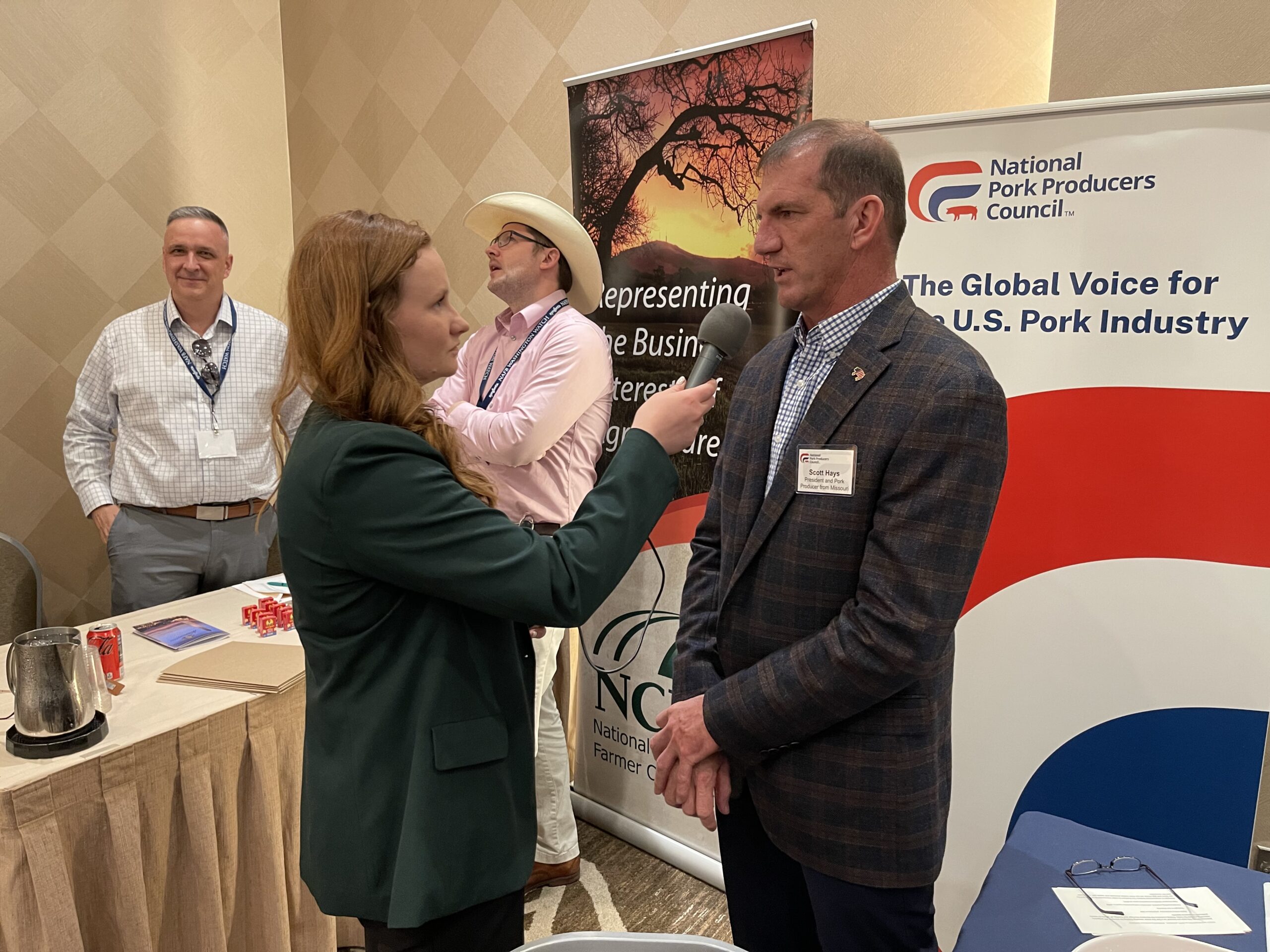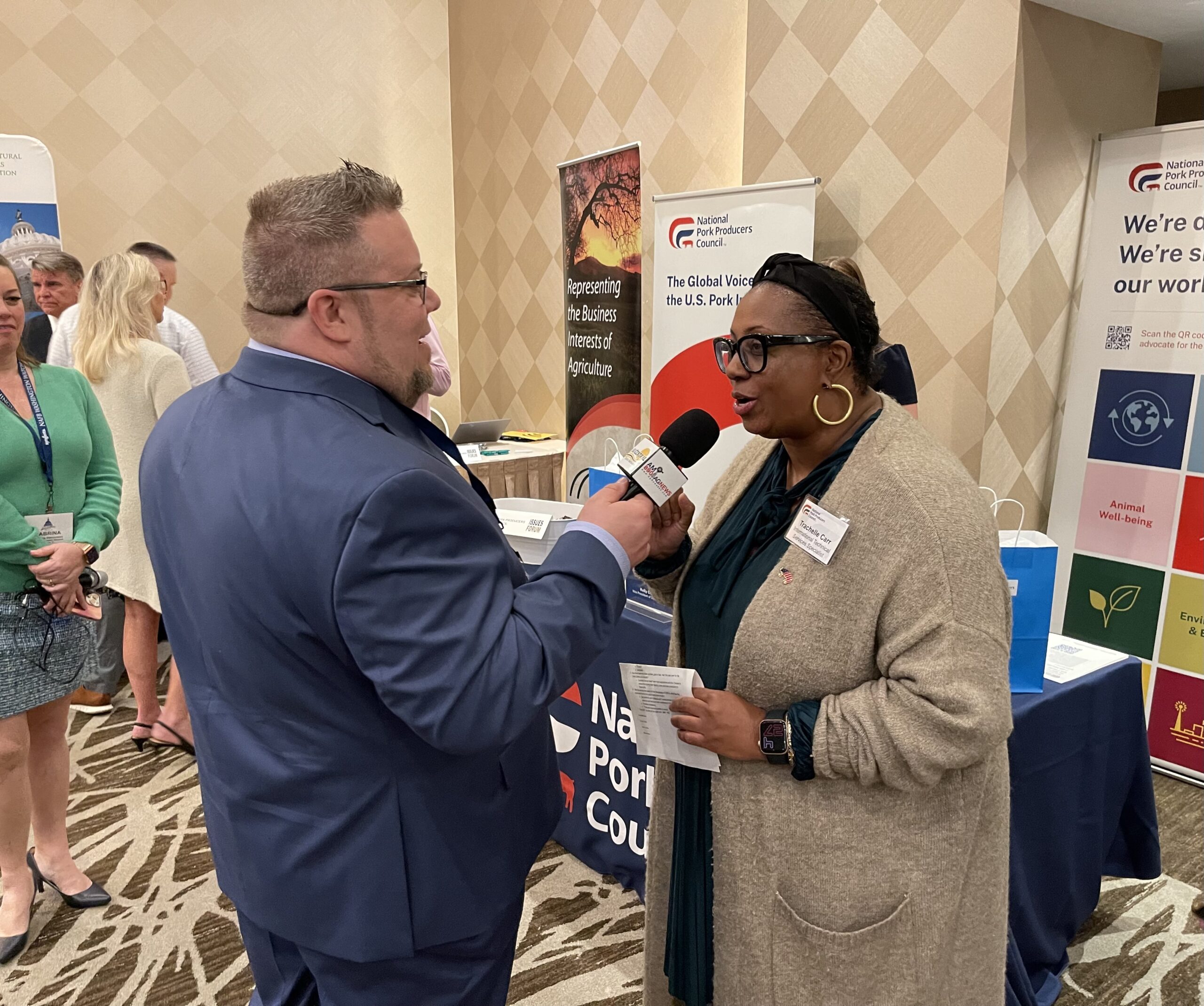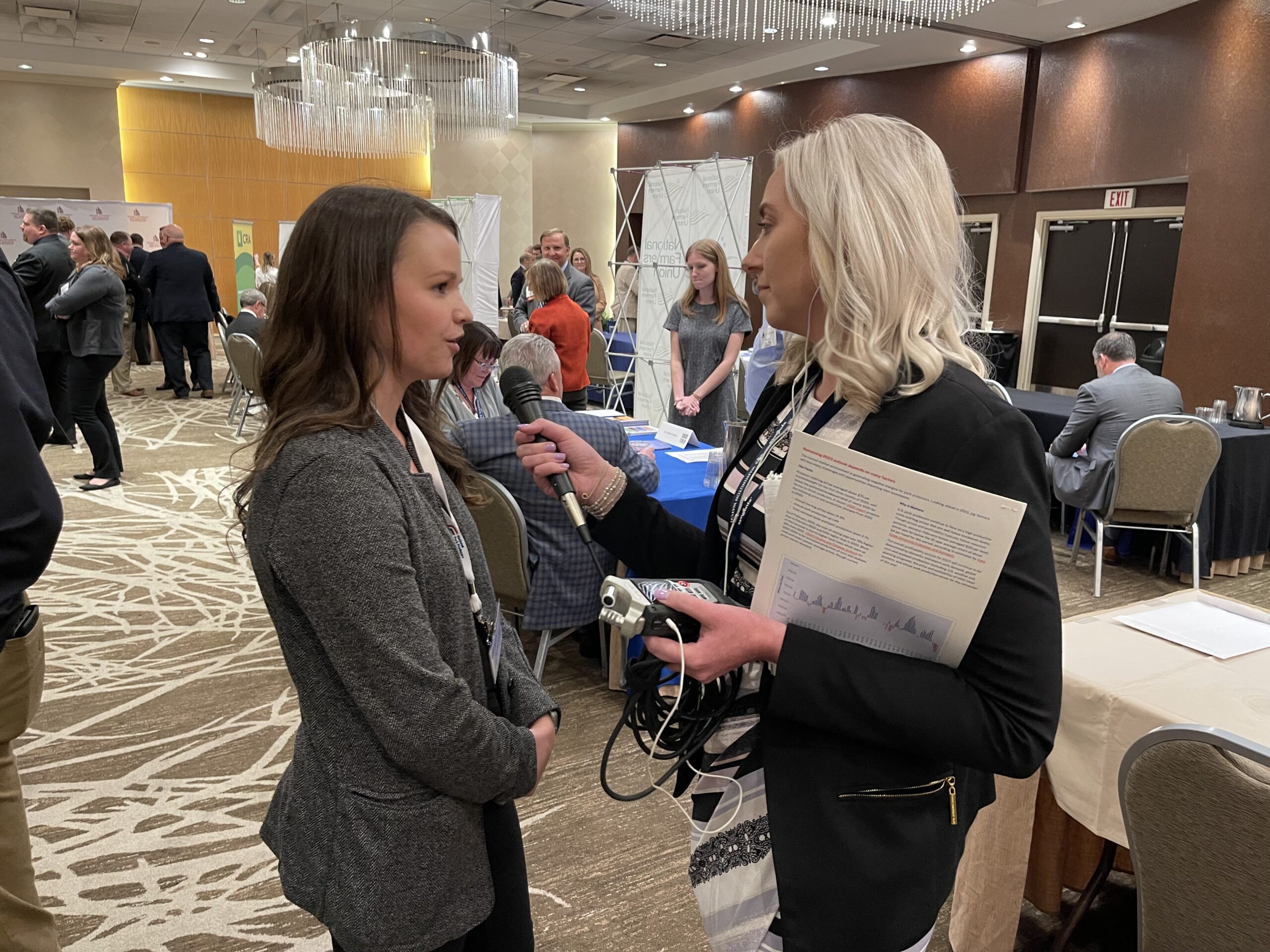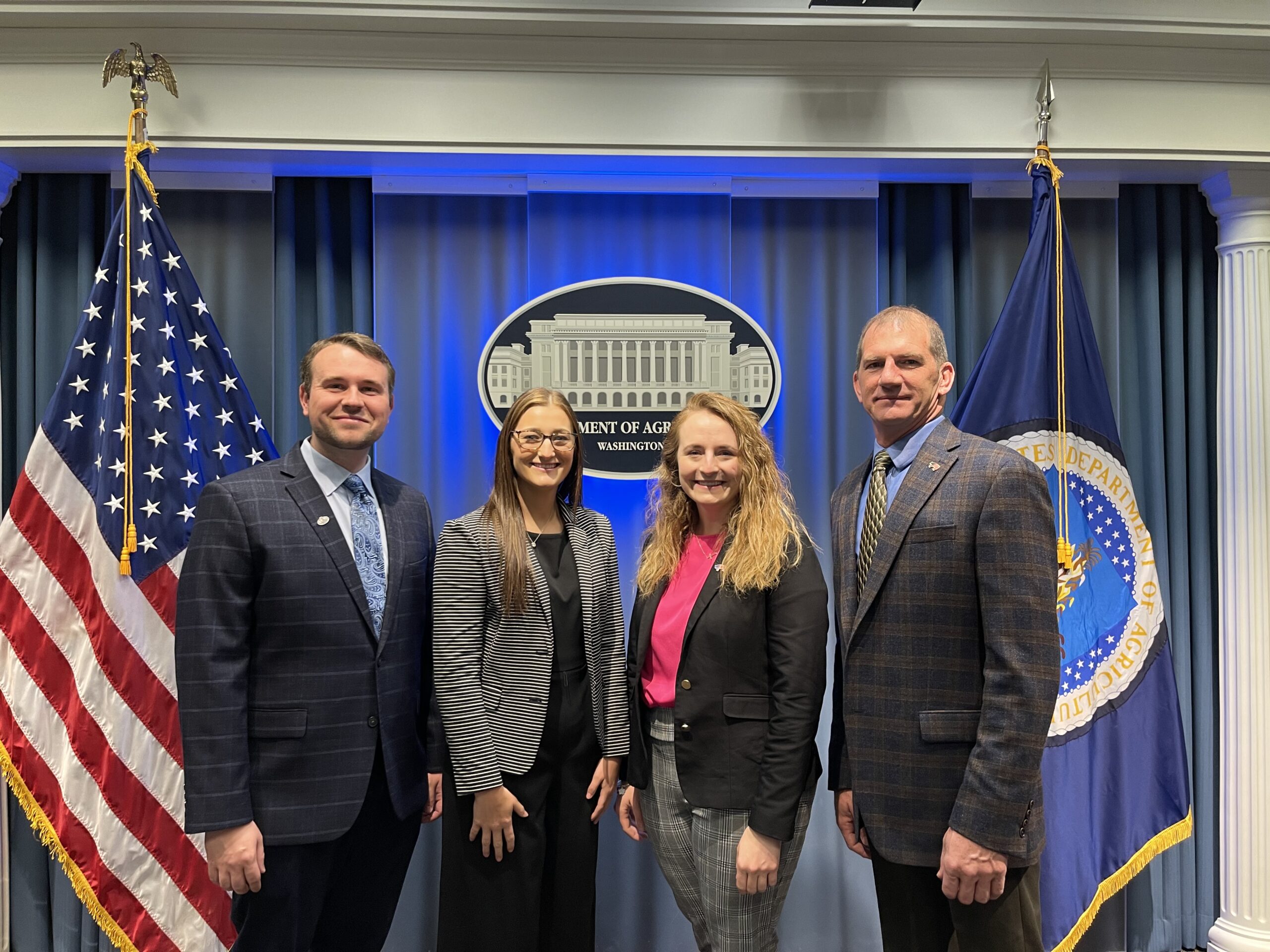Capital Update – For the Week Ending April 21, 2023
In this week’s National Pork Producers Council (NPPC) Friday recap: NPPC submits letter to SEC, House Ag Subcommittee reviews USDA animal disease efforts, USDA APHIS ASF ad campaign wins an award, NPPC Q2 economic update and NPPC participates in NAFB Washington Watch’s Issues Forum. Take a deeper dive below.
NPPC Submits Letter to SEC on Proposed Rules on Enhancement and Standardization of Climate-Related Disclosures for Investors
What happened: NPPC, together with six other agricultural organizations, submitted supplemental comments to the Securities and Exchange Commission (SEC) laying out a clear case for why agriculture, and the food supply chain, should be exempt from reporting under the SEC’s proposed climate change disclosure rules.
What did the letter state: The letter, which follows a series of meetings between agricultural representatives and the SEC as well as repeated concerns raised by members of Congress, supplements earlier comments the coalition submitted in June 2022.
It highlights several problems with the proposed disclosure rule, and how it will inadvertently be used to create obligations for farmers to report emissions. The letter provided the SEC additional legal analysis highlighting why the Commission cannot conclude a final disclosure rule that subjects farmers to reporting, and it lays out a path for the SEC to utilize in order to exempt agriculture entirely from any obligation to report under the proposed rule.
The national agricultural associations are urging the SEC to either remove the Scope 3 emissions disclosure requirement, or substantially revise the Scope 3 requirement to include an explicit exemption for agricultural production.
NPPC’s take: This required reporting, tracking and disclosure rules will be expensive, invasive and nearly impossible for farmers and producers to comply with. Additionally, the SEC lacks any authority to impose these burdens on agriculture.
Family farms will be hit the hardest, with the rule driving greater consolidation and resulting in fewer farmsteads. While farmers and producers play a vital role in America’s supply chain, 98 percent of farms are family-owned, which means a considerable part of the agricultural, including the pork industry, does not fall under the SEC’s jurisdiction.
While agriculture has great concerns with the SEC’s proposed climate disclosure rule, we have an open and ongoing line of communication with the Commission and are working productively to address the inadvertent impacts that the climate disclosure rule might have on agricultural producers.
Read the letter here.
House Ag Subcommittee Reviews USDA Animal Disease Efforts
What happened: This week, the House Committee on Agriculture’s Subcommittee on Livestock, Dairy and Poultry held a hearing to review USDA’s efforts to address foreign animal diseases (FAD). Witnesses Jenny Moffitt, USDA’s Under Secretary for Marketing and Regulatory Programs, and Dr. Alecia Naugle, executive director for strategy and policy with USDA Animal and Plant Health Inspection Service’s (APHIS) Veterinary Services, detailed the agency’s strategies for animal disease prevention, detection and response, as well as efforts to promote animal health and support labs that deal with and conduct research on animal diseases.
Subcommittee Chairman Tracey Mann (R-KS) noted the hearing was timely because of the current threats from African swine fever (ASF) and Highly Pathogenic Avian Influenza (HPAI). He urged the next farm bill to continue addressing risks to animal health while bolstering the long-term ability of U.S. animal agriculture to be competitive. Several panel members, including Ranking Member Jim Costa (D-CA), stressed food is a national security issue and maintaining American agricultural productivity is vital.
In response to questions about keeping foreign animal and plant diseases and pests out of the U.S., Moffitt mentioned APHIS partners with U.S. Customs and Border Protection (CBP) to stop them from entering the country. On ASF, Moffitt said USDA is utilizing existing import controls to prevent it from reaching the U.S. mainland and is preparing for a U.S. outbreak by investing in different mechanisms and rapid responses. Additionally, the agency is conducting vaccine trials with multiple vaccine strains.
Why is this important: Animal diseases such as ASF and Foot and Mouth Disease (FMD) would devastate the U.S. pork industry if there were an outbreak in-country, as other countries would close their markets to U.S. pork exports. The pork industry is dependent on exports with last year representing 23.5% of total pork production and contributing $61.26 to the average price producers received for each hog marketed.
NPPC’s take: NPPC is continuing to urge Congress and USDA to help prevent and prepare for ASF and FMD. In the 2018 Farm Bill, the organization advocated for a FMD vaccine bank and more funds for the National Animal Health Laboratory Network. To address ASF, it has asked for more staff for APHIS’s Veterinary Services and funds for equipment and additional washout facilities for the National Veterinary Stockpile. NPPC has urged CBP to increase agricultural inspections at U.S. points of entry and has asked Congress for additional funds for agricultural inspectors and dogs.
USDA APHIS Ad Campaign on ASF Wins Award
What happened: USDA’s APHIS is continuing its efforts to keep ASF out of the U.S., a top priority for NPPC and the U.S. pork industry. It funded a communications campaign titled “Pigs Don’t Fly” that recently won a major award.
Sage Communications, which designed and executed the USDA APHIS campaign, won the Platinum Hermes Creative Award for its work. It is the highest-level honor from the Association of Marketing and Communication Professionals. The goal of the social media, digital display and radio advertisements is to educate the public about ASF and reduce the risk of spreading the pig-only disease to the U.S. In addition to English, social media and digital display ads are in Spanish, French, Haitian French and Mandarin. As of February 2023, the campaign has generated more than 45 million impressions, 200,000 clicks and 4.2 million video views.
Why is this important: ASF, which is not a threat to people but is highly contagious in hogs and has a nearly 100 percent mortality rate, was detected in the Dominican Republic and Haiti in July 2021, which was the first time in 40 years the disease had been in the Western Hemisphere. It also is prevalent in China, a major U.S. trading partner.
NPPC Q2 Economic Update Gives Snapshot of Current Pork Industry Opportunities and Challenges
What happened: NPPC released its latest pork industry Q2 economic update that provides a snapshot of top pork industry issues, current trends and market conditions impacting pig farmers.
Q2 takeaways include:
- Pork production increased 2.3 percent through the first quarter with the USDA now predicting a 1.4 percent increase in pork production in 2023.
- Retail, wholesale and farm level prices show a year-over-year decline.
- Pork and variety meat exports gained momentum in Q1.
- From September 2021 to 2022, the total value of wages paid to workers on U.S. pig farms increased 12.1 percent, while the number of workers declined by 0.4 percent.
- Pork producer returns for the remainder of 2023 will be influenced by various factors, including domestic and export pork demand and input prices.
What’s the word on the street: “The United States is a worldwide leader in pork production and a significant contributor to the U.S. economy,” said Duane Stateler, NPPC Vice President and pork producer from McComb, Ohio. “While many factors can impact our business, especially during this period of high inflation and difficult market conditions, pork producers around the country will continue navigating the economic challenges to ensure we raise safe, wholesome and affordable food for communities here and around the world.”
If you want more: In addition to the quarterly update, NPPC released a national and 21 state-level economic reports last year. These reports highlight how the pork industry contributes at a grassroots level and illustrate the industry breadth in producing affordable, safe and nutritious pork for consumers worldwide.
Get quick snapshots on NPPC’s Facebook, LinkedIn and Twitter, and learn more on NPPC’s economic update dashboard.
NPPC Participates in NAFB Washington Watch’s Issues Forum
What happened: This week, NPPC took part in the National Association of Farm Broadcasting’s (NAFB) annual ‘Issues Forum’ in Washington, DC. ‘Issues Forum’ kicks off Washington Watch on Monday afternoon and connects agriculture broadcasters and industry leaders to discuss key issues and topics impacting U.S. farmers and producers.
The three-day event included a cybersecurity conversation with Federal Bureau of Investigation (FBI) Special Agent, Jonathan Lund, and discussions with National Agricultural Statistics Service (NASS) Administrator, Hubert Hamer, Under Secretary for Farm Production and Conservation Risk Management Agency, Robert Bonnie, Risk Management Agency (RMA) Deputy Administrator, Delores Dean, and Secretary of Transportation, Pete Buttigieg, while at USDA.
Randy Russell, of The Russell Group, gave a 2023 Farm Bill update and Bruce Knight, of Strategic Conservation Solutions, chatted about the partnership for climate-smart commodities. Also, attendees had an opportunity to hear from 15 U.S. Senators and Representatives, including Senate Agriculture Committee Chair, Senator Debbie Stabenow (D-MI), Senate Agriculture Committee Ranking Member, Senator John Boozman (R-AR), and House Agriculture Committee Chair, Congressman Glen “GT” Thompson (R-PA), and Chairwoman, Jessica Rosenworcel, and Commissioner, Geoffrey Starks, of the Federal Communications Commission.
Why is this important: Farm broadcasters are a trusted source, provide an invaluable service and are a vital tool for communicating with the agricultural community as they continue to tell the story of the industry – the who, what, how and where of America’s food, fiber and fuel system. Those involved in NAFB alone provide programming on more than 1,500 radio stations and TV networks nationwide and connect with an estimated 3.18 million U.S. farmers and ranchers daily.
With over 20 associations, companies and organizations in attendance, ‘Issues Forum’ is an opportunity to gather, network and share messages through audio and visual programming for listeners and viewers across urban and rural America.
NPPC’s take: NPPC participated in ‘Issues Forum’ to communicate with farmers and producers across the country on how the organization is fighting for reasonable public policies that will ensure the U.S. pork industry can continue to provide consumers with safe and nutritious pork products.
NPPC’s subject matter experts collectively conducted over 35 interviews on its policy priorities, including California Proposition 12, the 2023 Farm Bill, expanding international trade and the value-add the U.S. pork industry brings to the American economy.
Dive deeper: Check out the NAFB Washington Watch 2023 program, and learn more about NPPC’s current policy priorities.

Lydia Johnson, with Agri-Pulse Communications, interviewing NPPC President and pork producer from Missouri, Scott Hays, at NAFB Washington Watch’s Issues Forum.

Jamie Dickerman, Ag Central Radio Network, interviewing NPPC’s International Technical Services Specialist, Dr. Trachelle Carr, at NAFB Washington Watch’s Issues Forum.

Delaney Howell, with Ag News Daily, interviewing NPPC’s Staff Economist, Holly Cook, at NAFB Washington Watch’s Issues Forum.

Left to right: NPPC’s Regional Director of Producer Services, Josh Scramlin, Communications Intern, Grace Howe, Manager of Marketing and Digital Communications, Mikayla Dolch, and President and pork producer from Missouri, Scott Hays, at USDA.